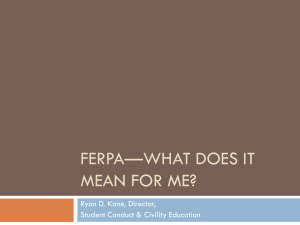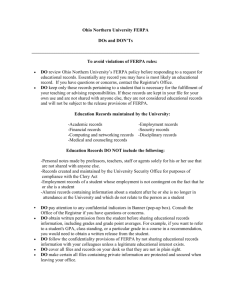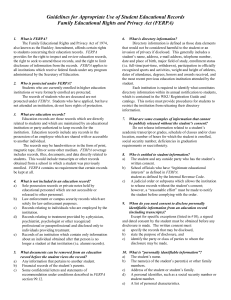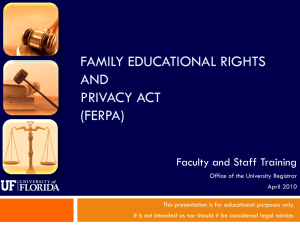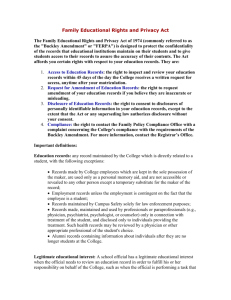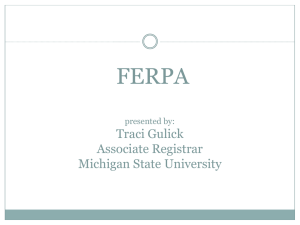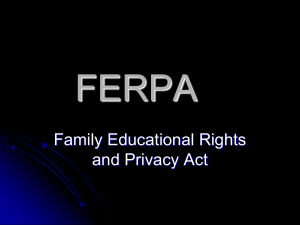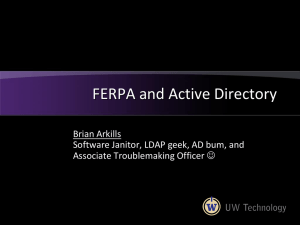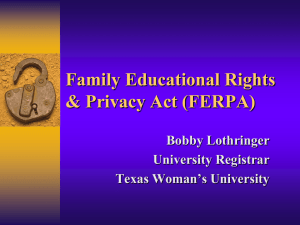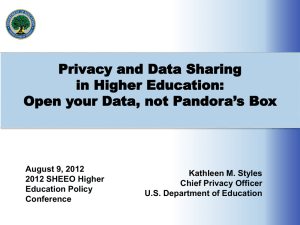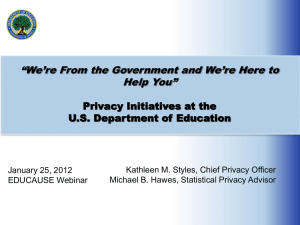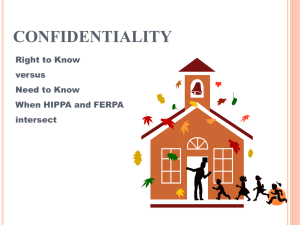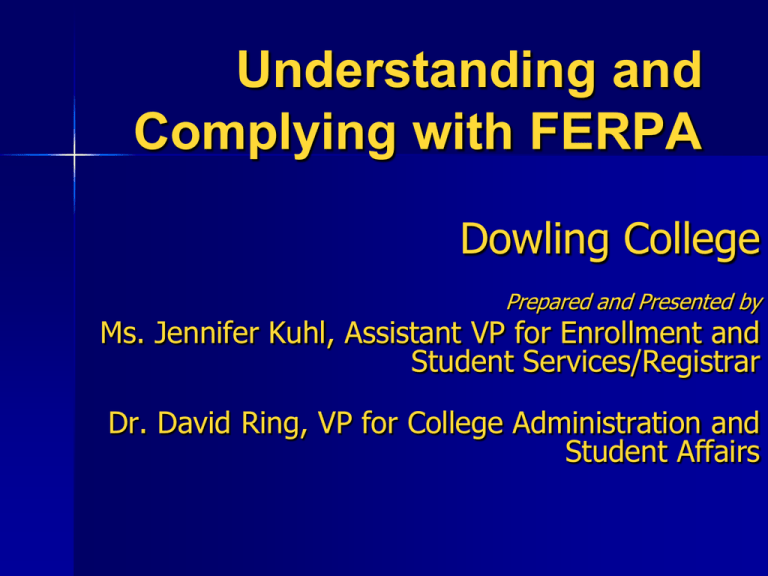
Understanding and
Complying with FERPA
Dowling College
Prepared and Presented by
Ms. Jennifer Kuhl, Assistant VP for Enrollment and
Student Services/Registrar
Dr. David Ring, VP for College Administration and
Student Affairs
What is FERPA?
It stands for the Family
Educational Rights and Privacy
Act of 1974.
Also known as the Buckley
Amendment.
Family Educational Rights
and Privacy Act of 1974
“A federal law designed to protect the
privacy of education records, to establish
the right of students to inspect and
review their education records, and to
provide guidelines for the correction of
inaccurate and misleading data through
informal and formal hearings.”
Why Comply with FERPA?
It’s the Law.
Failure to comply could result
in the withholding of Federal
Funds, including Student
Financial Aid.
Lawsuits caused by violations
cost time and $$$.
Family Educational Rights
and Privacy Act of 1974
This act is enforced by the Family Policy
Compliance Office, U.S. Department of
Education, Washington, DC.
The Family Policy Compliance Office is
the office within the Department of
Education that administers FERPA and is
responsible for providing technical
assistance regarding FERPA to
educational institutions.
FERPA is applies to both K-12 and higher
education.
The Family Compliance Office is responsible
for both levels of education.
The primary difference in FERPA between these
two levels is that the rights are ascribed to the
“student” at the higher education level, and
ascribed to the parents at the K-12 level.
FERPA rights are granted to parents until their
son/daughter reaches the age of 18 or begins
attending an institution of higher education,
regardless of age.
The Essence of the Act
College students must be permitted to
inspect their own education records.
School officials may not disclose
personally identifiable information about
students nor permit inspection of their
records without their written permission,
unless such action is covered by certain
exceptions permitted by the Act.
Key Terms
Student
Education Record/ Personally
Identifiable Information
Directory Information
School Officials
Legitimate Educational Interest
Who IS and IS NOT
Covered Under FERPA?
Students who are or have
been in attendance at a
postsecondary institution are
covered under FERPA.
Applicants who are denied
admission or who never
attend are not covered under
FERPA.
When do FERPA Rights Begin
and End for a Student?
Rights begin when the student is “in
attendance” as defined by the institution.
For Dowling College this means a student is
officially registered for at least one class and
that class has started.
FERPA rights continue after the student
leaves the institution and are only
terminated upon death of the student.
Student (and Former Student)
Rights Under FERPA
To inspect their
education records.
To request an
amendment to their
record and a hearing if
the request is for
amendment is
unsatisfactory.
Student (and Former Student)
Rights Under FERPA Continued…
To file a complaint with The U.S. Dept. of
Education if they feel their rights are being
violated.
To expect that their education records are kept
confidential except where special provisions are
made.
To suppress the disclosure of directory
information.
What are Education
Records?
Records that directly relate to a
student and are maintained by an
institution.
These records can be in any media
form: handwritten, print, type, film,
electronic, microfiche, etc.
What Information Must be
Handled in a Secure Way?
Any personally identifiable piece of
information, other than strictly directory
information. Items such as those listed
below fall into this category.
Registration forms
Transcripts
Student information displayed on a computer screen
Grades
Student schedules
Class assignments
Class Rosters
Reports/documents containing Student ID/SSN
What are NOT Considered
to be Education Records:
Personal Notes – kept by a
faculty/staff member and if ONLY
kept in the sole possession of the
one who made the record.
Personal Notes taken in conjunction
with any other person are not sole
possession notes.
Sharing personal notes with another
person or placing them in an area
where they can be viewed by others
classifies them as “education records”.
Also NOT Considered to be
Education Records…
Law Enforcement Unit Records – maintained
solely for law enforcement purposes &
revealed only to law enforcement
agencies.
Employment Records – of those whose
employment is not contingent upon
being a student.
Records created as a result of being a student
(work study, graduate assistant, etc.) are
education records.
Medical Records - created by a health care
professional used only for the
medical/health treatment of the
student.
Alumni Records - created after student
has left the institution.
What Information can be
Released?
Directory Information.
Information that the student has
given written consent to release.
Information needed by College
officials who have a legitimate
educational interest.
Information needed by certain
government agencies.
What is “Directory
Information”?
It is information that can be
released without the student’s
written consent.
Each college, to some extent, can
determine what information is
classified as directory information.
Directory Information at
Dowling College includes:
Name
Address
Telephone number
Campus email address
Field of study, including majors, minors,
certifications, and pre-professional areas of study
Class (e.g. sophomore)
Enrollment status (full-time, part-time, or less
than part-time)
Participation in officially recognized activities and
sports, including photographs of athletes
Dates of attendance, including matriculation,
drop, and withdrawal dates
Directory Information
continued…
Degrees and certificates received including date
awarded
Awards received, including deans list, institutional
honors, departmental honors, and memberships in
national honor societies
Previous education institutions attended
What is NEVER Directory
Information:
Race
Gender
Grades
GPA
Country of Citizenship
SSN/Student Number
Religion
Release of Information with
Consent
Non-directory information may be released with
the student’s consent.
A completed and signed Release for Disclosure of
Educational Records form will grant the College
permission to release specific non-directory
information to third parties, provided the student
specifically authorizes the designated third party
as being permitted access to the particular
information requested.
Release of Information with
Consent
Continued…
The Release for Disclosure of Educational
Records form can be found in the Office of the
Registrar, FH 106 or downloaded from the
Registration and Student Records Central web
page at
http://www.dowling.edu/mydowling/registrati
on/
The consent form will remain active until
officially withdrawn in writing by the student.
FERPA Hold
Students have the right under the law
of FERPA to request that their
directory information not be released.
To institute a FERPA hold, the student
must submit their request in writing
to the Office of the Registrar, 106
Fortunoff Hall.
FERPA Hold
Prevents the College from
releasing any information about a
student
The College cannot even
acknowledge that the person is a
student at Dowling
Strongly recommend against
students obtaining a FERPA hold,
unless it is absolutely necessary
Who Can Access
Student Information
Without Obtaining
Written Consent?
College faculty, staff, and other
designated officials, who, to carry out
their responsibilities, have a legitimate
educational interest.
A Designated college official is a person
employed by the College in an
administrative, supervisory, academic,
research, or support staff position (including
law enforcement unit personnel and health
staff). Also considered college officials are
members of the Board of Trustees, a person
or company with whom the College has
contracted (such as an attorney, auditor, or
collection agent), temporary employees,
student workers, and graduate assistants
employed by the College.
Legitimate Educational Interest is
Defined as the Need to Know in
Order to:
Perform an administrative task outlined
in persons official job duties
Perform a supervisory or instructional
task directly related to the student’s
education
Perform a service or benefit for the
student such as health care, job
placement, financial aid, etc.
Who Else Can Access Student
Information Without Obtaining Prior
Written Consent?
The individual student
Whomever the student authorizes
by providing the institution with a
written release (release must be
written, signed and dated and must
specify the records to be disclosed
and the identity of the recipient)
Parties requesting directory
information (unless the student has
a Privacy or FERPA hold)
Officials of other schools in which a
student seeks or intends to enroll or
is enrolled
Parents if parents claim the student as a
dependent for tax purposes. The College will
exercise this option only on the condition that
evidence of such dependency is furnished to the
Office of the Registrar and all requests for
disclosures are referred to that office
Persons in connection with a health or safety
emergency
An alleged victim of an alleged perpetrator of a
crime of violence or a non-forcible sex offense in
connection with a Disciplinary Proceeding
Parents regarding alcohol and drug violations of a
student under 21 years of age
Parents’ Rights
Parents may obtain directory
information.
Parents may obtain non-directory
information by obtaining a signed
consent from their child.
TAKE NOTE:
Access to student information via
computer software does not
authorize unrestricted use of that
information.
Curiosity is not a valid reason to
view student information.
Records should only be accessed in
the context of official business.
MORE Important
Information:
When in doubt – Don’t Give It Out!!
Refer requests for student academic
information to the Office of the Registrar.
Information about a student can be
released with a signed consent from the
student.
Information on a computer should be
treated with the same confidentiality as a
paper copy.
More, More Important
Information…
Do not leave confidential
information displayed on an
unattended computer.
Cover or put away papers that
contain confidential information if
you are going to step away from
your desk.
Record Disposal
Records containing
Social Security Numbers
or grades should be
shredded, not just
thrown in the garbage or
placed in an unsecured
recycling bin.
Helpful Hints for Faculty
To Avoid FERPA Violations…
Please DO NOT
Use the SSN/Student ID to post
grades.
Leave graded tests in a stack for
students to sort through.
Circulate a printed class list with the
Student Name and SSN/Student ID.
Helpful Hints Continued
To Avoid FERPA Violations…
Please DO NOT
Provide anyone with student schedules.
Provide anyone with lists of students enrolled in
your classes.
Include confidential information (e.g., grades,
GPA, #of credits) in a recommendation letter
without the written consent of the student.
Letters of
Recommendation
If non-directory information is included
in a letter of recommendation, you
must have a signed consent from the
student.
The signed consent should include the
following:
Who has permission to write the letter
Where the letter should be sent to
What non-directory information should be
included
Sample Permission Letter for
Writing a Letter of
Recommendation
I give permission for Dr. Payne to write a letter
of recommendation to:
Sachem Central School District Office
111 Union Avenue
Holbrook, NY 11741
Dr. Payne has my permission to include my
grades, GPA, and class rank in this Letter.
I waive/do not waive my right to review a
copy of this letter at any time in the future.
Signature
Date
For Additional Information
Visit the web at
http://www.dowling.edu/mydowling/registration/
ferpa.shtm or contact:
– Ms. Jennifer Kuhl, Registrar at x3273 or
kuhlj@dowling.edu
– Ms. Nadine Lauria, Associate Registrar at x3257 or
Laurian@dowling.edu
– Dr. David Ring, VP for Administration and Student
Affairs at x3054 or Ringd@dowling.edu

